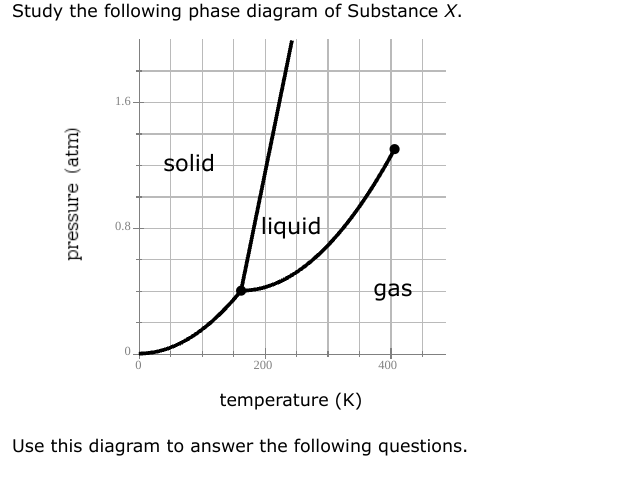Suppose a small sample of pure X is held at -182. °C and 0.8 atm. What will be the state of the sample (solid, liquid, or gas)? - Suppose the temperature is held constant at -182. °C but the pressure is increased by 0.3 atm. What will happen to the sample (nothing, it will melt, it will freeze, it will boil, it will condense, it will sublime, or it will deposit)? - Suppose, on the other hand, the pressure is held constant at 0.8 atm but the temperature is increased by 178.°C. What will happen to the sample (nothing, it will melt, it will freeze, it will boil, it will condense, it will sublime, or it will deposit)?
Suppose a small sample of pure X is held at -182. °C and 0.8 atm. What will be the state of the sample (solid, liquid, or gas)? - Suppose the temperature is held constant at -182. °C but the pressure is increased by 0.3 atm. What will happen to the sample (nothing, it will melt, it will freeze, it will boil, it will condense, it will sublime, or it will deposit)? - Suppose, on the other hand, the pressure is held constant at 0.8 atm but the temperature is increased by 178.°C. What will happen to the sample (nothing, it will melt, it will freeze, it will boil, it will condense, it will sublime, or it will deposit)?
Principles of Modern Chemistry
8th Edition
ISBN:9781305079113
Author:David W. Oxtoby, H. Pat Gillis, Laurie J. Butler
Publisher:David W. Oxtoby, H. Pat Gillis, Laurie J. Butler
Chapter10: Solids, Liquids, And Phase Transitions
Section: Chapter Questions
Problem 45P
Related questions
Question
100%
- Suppose a small sample of pure X is held at -182. °C and 0.8 atm. What will be the state of the sample (solid, liquid, or gas)?
- Suppose the temperature is held constant at -182. °C but the pressure is increased by 0.3 atm. What will happen to the sample (nothing, it will melt, it will freeze, it will boil, it will condense, it will sublime, or it will deposit)?
- Suppose, on the other hand, the pressure is held constant at 0.8 atm but the temperature is increased by 178.°C. What will happen to the sample (nothing, it will melt, it will freeze, it will boil, it will condense, it will sublime, or it will deposit)?
This all part of one question

Transcribed Image Text:Study the following phase diagram of Substance X.
pressure (atm)
1.6-
0.8+
0_
0
solid
liquid
200
gas
400
temperature (K)
Use this diagram to answer the following questions.
Expert Solution
This question has been solved!
Explore an expertly crafted, step-by-step solution for a thorough understanding of key concepts.
Step by step
Solved in 5 steps with 4 images

Knowledge Booster
Learn more about
Need a deep-dive on the concept behind this application? Look no further. Learn more about this topic, chemistry and related others by exploring similar questions and additional content below.Recommended textbooks for you

Principles of Modern Chemistry
Chemistry
ISBN:
9781305079113
Author:
David W. Oxtoby, H. Pat Gillis, Laurie J. Butler
Publisher:
Cengage Learning

Chemistry: Principles and Practice
Chemistry
ISBN:
9780534420123
Author:
Daniel L. Reger, Scott R. Goode, David W. Ball, Edward Mercer
Publisher:
Cengage Learning

Introductory Chemistry: An Active Learning Approa…
Chemistry
ISBN:
9781305079250
Author:
Mark S. Cracolice, Ed Peters
Publisher:
Cengage Learning

Principles of Modern Chemistry
Chemistry
ISBN:
9781305079113
Author:
David W. Oxtoby, H. Pat Gillis, Laurie J. Butler
Publisher:
Cengage Learning

Chemistry: Principles and Practice
Chemistry
ISBN:
9780534420123
Author:
Daniel L. Reger, Scott R. Goode, David W. Ball, Edward Mercer
Publisher:
Cengage Learning

Introductory Chemistry: An Active Learning Approa…
Chemistry
ISBN:
9781305079250
Author:
Mark S. Cracolice, Ed Peters
Publisher:
Cengage Learning

Chemistry: The Molecular Science
Chemistry
ISBN:
9781285199047
Author:
John W. Moore, Conrad L. Stanitski
Publisher:
Cengage Learning


Chemistry: An Atoms First Approach
Chemistry
ISBN:
9781305079243
Author:
Steven S. Zumdahl, Susan A. Zumdahl
Publisher:
Cengage Learning